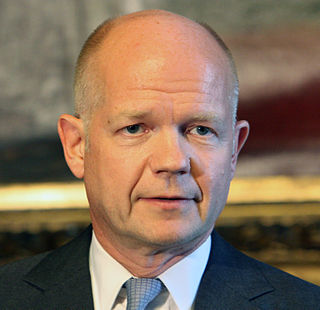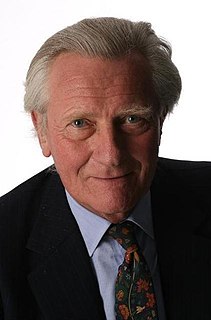
George Iain Duncan Smith, often referred to by his initials IDS, is a British Conservative Party politician. The Secretary of State for Work and Pensions from 2010 to 2016, he was previously the Leader of the Conservative Party and Leader of the Opposition from 2001 to 2003. He was first elected to Parliament at the 1992 general election as the MP for Chingford—which he represented until the constituency's abolition in 1997—and he has since represented its successor constituency of Chingford and Woodford Green.
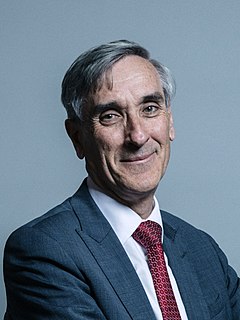
Sir John Alan Redwood is a British Conservative Party politician, and Member of Parliament (MP) for Wokingham in the county of Berkshire. He was formerly Secretary of State for Wales in Prime Minister John Major's Cabinet, and was twice an unsuccessful challenger for the leadership of the Conservative Party in the 1990s.

The Pro-Euro Conservative Party was a British political party announced by John Stevens and Brendan Donnelly in February 1999, formed to contest the 1999 European Parliament Elections. The founders were Members of the European Parliament who had resigned from the UK Conservative Party in protest at its anti-euro stance. Their reported aim was to replace Eurosceptic William Hague as Conservative leader with Europhile Kenneth Clarke. Stevens later said that they had intended to push Ken Clarke, Michael Heseltine, Chris Patten and other pro-Europeans in the Conservative Party into "an SDP-style breakaway, in combination with the Liberal Democrats". The Pro-Euro Conservative Party disbanded in 2001.
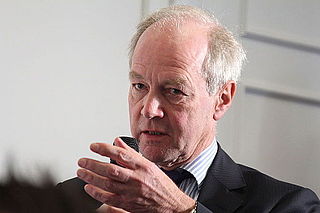
Peter Bruce Lilley, Baron Lilley, PC is a British Conservative politician who was a Member of Parliament (MP) from 1983 to 2017 representing the constituency of Hitchin and Harpenden from 1997 and, prior to boundary changes, St Albans. He was a Cabinet minister in the governments of Margaret Thatcher and John Major, serving as Trade and Industry Secretary from July 1990 to April 1992, and as Social Security Secretary from April 1992 to May 1997, when he introduced Incapacity Benefit.
Robert Victor Jackson is a politician in the United Kingdom. He was a Member of the European Parliament (MEP) from 1979 to 1984 and Member of Parliament (MP) for Wantage from 1983 to 2005, having been elected as a Conservative; however, he joined the Labour Party in 2005.

Eric Forth was a British Conservative Party politician. He was the Member of the European Parliament (MEP) for Birmingham North from 1979 until 1984. He was then the Member of Parliament (MP) for Mid Worcestershire from 1983 until 1997. Finally, he was the MP for Bromley and Chislehurst from 1997 until his death in 2006. He served as a junior minister in the governments of Margaret Thatcher and John Major between 1988 and 1997. In his obituaries, he was described as "colourful", "flamboyant", "provocative" and a "right-wing libertarian". He was noted for his colourful ties and waistcoats, sideburns, and jewellery.
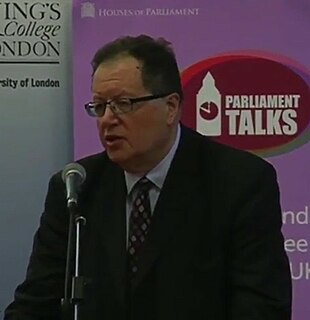
Timothy Eric Boswell, Baron Boswell of Aynho is an English politician who was formerly the Conservative Member of Parliament (MP) for Daventry from 1987 until he retired at the 2010 general election.
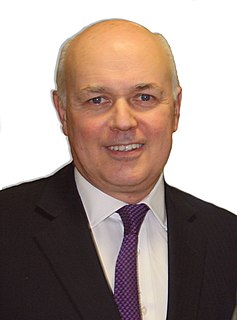
The 2001 Conservative Party leadership election was held after the British Conservative Party failed to make inroads into the Labour government's lead in the 2001 general election. Party leader William Hague resigned, and a leadership contest was called under new rules Hague had introduced. Five candidates stepped forward: Michael Ancram, David Davis, Kenneth Clarke, Iain Duncan Smith and Michael Portillo.
In the parliamentary politics of the United Kingdom and Canada, one member, one vote (OMOV) is a method of selecting party leaders by a direct vote of the members of a political party. Traditionally, these objectives have been accomplished either by a party convention, a vote of members of parliament, or some form of electoral college. OMOV backers claim that OMOV enhances the practice of democracy, because ordinary citizens will be able to participate. Detractors counter that allowing those unversed in the issues to help make decisions makes for bad governance.

The 2005 Conservative Party leadership election was called by party leader Michael Howard on 6 May 2005, when he announced that he would be stepping down as Leader of the Conservative Party in the near future. However, he stated that he would not depart until a review of the rules for the leadership election had been conducted, given the high level of dissatisfaction with the current system. Ultimately, no changes were made and the election proceeded with the existing rules, which were introduced in 1998.
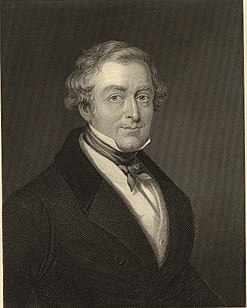
The Conservative Party is the oldest political party in the United Kingdom and arguably the world. The current party was first organised in the 1830s and the name "Conservative" was officially adopted, but the party is still often referred to as the Tory party. The Tories had been a coalition that more often than not formed the government from 1760 until the Reform Act 1832. Modernising reformers said the traditionalistic party of "Throne, Altar and Cottage" was obsolete, but in the face of an expanding electorate 1830s–1860s it held its strength among royalists, devout Anglicans and landlords and their tenants.

The 1990 Conservative Party leadership election in the United Kingdom took place on 20 November 1990 following the decision of Michael Heseltine, former Defence and Environment Secretary, to challenge Margaret Thatcher, the incumbent Prime Minister, for leadership of the Conservative Party.

The 1995 Conservative Party leadership election was initiated when the incumbent leader and Prime Minister, John Major, resigned as leader on 22 June 1995, in order to face his critics within the party. On 4 July 1995, he was re-elected, beating the only other candidate, the former Secretary of State for Wales, John Redwood.

The 2003 Conservative Party leadership election was caused by the enforced resignation of incumbent leader Iain Duncan Smith after the loss of a confidence vote among his parliamentary party. The causes of Duncan Smith's fall are often cited as his lack of charisma and impact with the public, the uninspired direction of the party under his leadership, and his previous failure to achieve more than a third of support among Members of Parliament in the 2001 leadership contest. In the event, the Conservative Party coalesced around Michael Howard as replacement leader and there was not a contest to replace Duncan Smith.
Sir George Arthur Gardiner was a British Conservative Party politician and journalist. Two months before the 1997 general election he defected to the Referendum Party, becoming the only MP it ever had. The party dissolved later that year.










